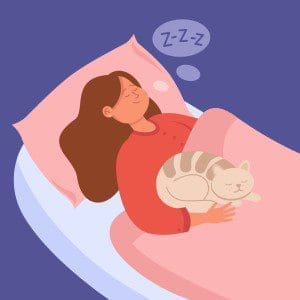Sleep Relief and Your Benefits

What do you get when you eat cookies in bed? Crumby sleep! Get it, crummy sleep? That joke may or may not be funny, but what’s definitely not funny is when you do get crummy sleep. Getting enough rest is vital to our overall health and wellness. Keep reading to learn about how important it is to get proper sleep, ways to get proper sleep, and how your employer-sponsored benefits may help.
CDC Recommendations
The CDC says that adults 18 years and older need to get 7 hours or more per night. School-aged children need 9-12 hours, and teens should get 8-10 hours. Unfortunately, many of us don’t get as much as we need.
Why can’t I fall asleep?
Many Americans like to stay up late but then have to wake up early for work or family responsibilities. Others struggle with insomnia or the inability to fall or stay asleep. Up to one-third of adults have insomnia at some point in their lives. As many as 30% of Americans have sleep apnea. Other issues that can keep people awake at night include:
- Stress
- Chronic pain
- Prescription medications
- Diet (heavy foods or late-night eating)
- Lack of exercise
- Caffeine
- Irregular schedule
- Pregnancy
- Smoking
- Alcohol
- Illicit drugs
Inadequate Sleep and Your Health
Almost everyone deals with poor sleep at some point. Occasional causes include working late, studying for school, or caring for small children. Any lack of sleep can result in fatigue the next day, but the real problems begin when it becomes a recurring chronic issue.
Inadequate sleep impacts your body and mind in many ways. Fatigue can affect concentration and judgment. That may lead to irritability, errors, accidents, and reduced productivity. Chronic deprivation may also lead to more severe issues, including:
- Depression
- Arthritis
- Heartburn
- Chronic pain
- Reduced sex drive
- Asthma
- COPD
- Heart issues
- Thyroid problems
- Stroke
- Sleepwalking
- Narcolepsy
- Alzheimer’s
- Parkinson’s
Sleep Relief Measures
Consider tracking your nightly habits if you experience chronic issues. Note what you ate and drank that day, what medications you took, when you actually went to bed, how many times you woke up, what you did right before bed, how many hours you slept, etc. You can help you identify small changes in habits to help you sleep better, like avoiding caffeinated drinks in the evening or eating late at night.
If you still have chronic sleep issues, see your primary care doctor. Funds in a Flexible Spending Account (FSA), Health Reimbursement Arrangement (HRA), or Health Savings Account (HSA) may pay for help. Examples of eligible products and services include:
- Co-pays and deductibles
- Prescription and OTC sleep medications
- Sleep deprivation treatments
- CPAP machines and related supplies
- Sleep masks
I don’t know what’s keeping you awake or tell you for sure how to fix it. But I do know that you may be able to use your benefit accounts for products and services that can help you get more rest. And I can also say that I really don’t recommend eating cookies in bed – crumbly sheets are crummy to sleep on!
